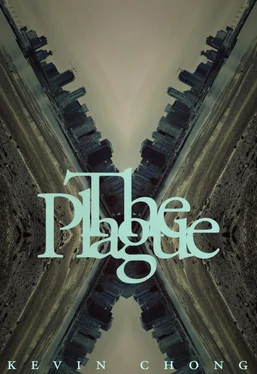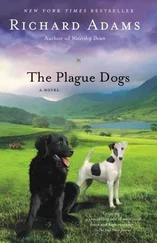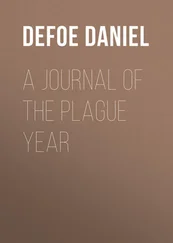When he came through the door, his boys tottered toward him, each holding out their arms like high-wire performers. They’d started walking only two weeks earlier, and he saw their steps grow more steady with each new day.
Perhaps, Siddhu considered, the image of their father grimacing at them would have no effect on their psyches. They would not remember the days when Daddy pried them off with a closed umbrella on the way to the sink to scrub his hands. He returned, eyes smiling, grabbing each of them under his arms and spinning around until they squealed and giggled.
“Put them down,” Uma Siddhu said. She was wearing an apron and a high-school era sweatshirt. “Time to eat.”
“You should have started without me.”
“Don’t tell me what to do.”
“You know you get angry when you’re hungry.”
“And you know you get stupid when you open your mouth.”
So far, there had been no reports of the disease outside the city’s downtown core. Uma still suggested that he take a leave from work. “You’re being an alarmist,” he said accusingly as Uma placed their dinner on the messy table where their boys had already eaten.
“What are you, then?” she asked back.
“Being rational.”
She scoffed at him. She was the even-tempered one in their marriage, the one who found compromise. He was the impulse shopper grabbing fistfuls of chocolate bars at the checkout counter. “There are no rationalists in these situations,” she told him. “There are those who let it happen to them and the alarmists. Pick a side.”
As they ate, they watched their boys in the living room ambling around, looking for something to topple. Before too long they would find each other. They would fight over a box. Tears would follow.
“This tastes good,” he told her. He didn’t even know what he was putting in his mouth. It was brown—it had been pressure-cooked—and served on rice. Her parents, who lived on the other side of the duplex, were in Asia, so he and Uma relished their ability to eat quick meals.
He didn’t want to make her angry. He did not want to tell her that he’d spent the day at a hospital speaking to health officials, who claimed to be waiting for results, and doctors. Or that he’d been in a hospital with people who didn’t cough into their elbows. Maybe Uma had a point about safety—he couldn’t take chances, now that he was a father. That’s why he’d sold his motorcycle and stopped playing rec hockey after he broke his ankle.
And he wanted to have sex with her that night, even if he needed to put the boys to sleep on his own (so she could relax) and take a shower. He listened to himself chew, to the clack of cutlery on plates.
“You know this is a great story,” he said. “It’ll be the only chance I get to write one.”
He could hear one boy creak, a prelude to angry sobs of a wish unheeded. The other one was cackling wickedly. Siddhu was reminded of the fact that his own younger brothers hadn’t called him since the summer.
“If you took on the metro beat, you could write about gang warfare. You could be first on the scene of every drive-by execution. If you pry enough, we might get threatening phone calls at night. You might even get killed, but you wouldn’t bring disease into this house,” she suggested. “Would that be exciting enough for you?”
“It’s not about excitement,” Siddhu told her. Correction: It was only partially about thrill. He was carrying out a promise he’d made to himself: The newspaper would die, but not because of his departure. He was a self-appointed officer aboard a sinking ship.
“Let that website cover the story,” she told him. “They’ve beaten you so far.”
It was true that GSSP had broken the news about the first fatalities. They had been the first to comment on the delays between setbacks in infection management and reports from the Health Authority. On one level, Siddhu had been glad that someone had reported the story. And yet he was stunned—up until then, GSSP’s reporting had been inept, even with its click-generated wealth. Until recently, they had only one reporter, the website owner, Elliot Horne-Bough, whom everyone referred to as Hornblow. He dressed in skinny neckties and took photos using a Polaroid camera. How could I be losing stories to him? And why does he want to hire me? Meanwhile, Siddhu was interviewing city councillors about the restricted access to disease flashpoints. In these areas, signage had been erected advising only local traffic to enter. Other notices strongly advised wearing face masks.
Today, he’d attended a mid-afternoon special council meeting that ended in a fight when a councillor from Romeo Parsons’ party attacked the mayor for his inability to immediately provide better temporary housing and showering stations in economically disadvantaged parts of the city. It represented Parsons’ first broken promise in his initial month as mayor, the councillor told him. Siddhu watched Parsons’ face as it tightened into something rigid and clenched before loosening back into appealing handsomeness.
The councillor, a twenty-nine-year-old advocate for sex workers, had been personally recruited by Parsons. When the mayor deflected her earnest pleas, she rose from her seat in the cherry-panelled council chambers. She was seated at the far end of the room from the mayor, and as she rushed toward him another female councillor, a Parsons loyalist from the same party, took her by the arm. The first councillor struck the other one with an open hand and left the council chambers.
Siddhu tried to change the discussion with Uma. He asked her about the boys’ music class—they banged tambourines on play mats while the teacher sang nursery rhymes. The range of their conversations had narrowed to two sharp points since the boys were born.
She brought out her smartphone. He decided not to repeat his question.
Siddhu offered to give the boys a bath while his wife watched Netflix. He decided against washing their hair to avoid tears and let them play with a plastic tea set. After their bath, he dried and dressed them, then flashed his yo-yo as both boys pulled themselves up against the crib railing. He was working on a more intermediate-level trick: Split the Atom. It started out like a Brain Twister but involved another step. The boys lost interest as he worked on the pushing motion. He won them back with his old standbys until they had slumped back into their cribs. Then he waited at the door until they cried themselves to sleep.
In the weeks that ensued, he would summon each of these moments to savour like heirlooms from a lost world.
His wife waited for him under the covers, already naked. As he stripped down, she held up a corner of the duvet for him like an open car door and he felt the chill of the air on his chest. He rolled toward her in bed, and they reached for each other, pulling all the compulsory levers. There was no time to tease or upgrade from the basic package. They felt grateful for the certainty of their flesh. A cry from the other room would force them to freeze; a longer wail would shut things down. Hurry, hurry. Success, success.
Siddhu lay there afterward in the light from the hall. The bedroom took on a grainy quality, and he slept poorly. Uma and the boys were still asleep when he awoke and packed his lunch. When he got on the bus, he found a seat—normally, he had to stand. On the SkyTrain, he was one of only two people in his car. From the station, he stepped outside to see that the sun had broken. The office buildings glinted in the damp air with the sheen of plastic wrap.
It had taken a potential health crisis for the mood in the office to brighten. People moved quickly. No one here thought that their work would gain new subscriptions or earn them kudos, but it seemed like a rewarding diversion. Like Siddhu, they saw opportunities for noble career deaths.
Читать дальше












